
Posted on 09/29/2008 5:29:47 AM PDT by Homer_J_Simpson

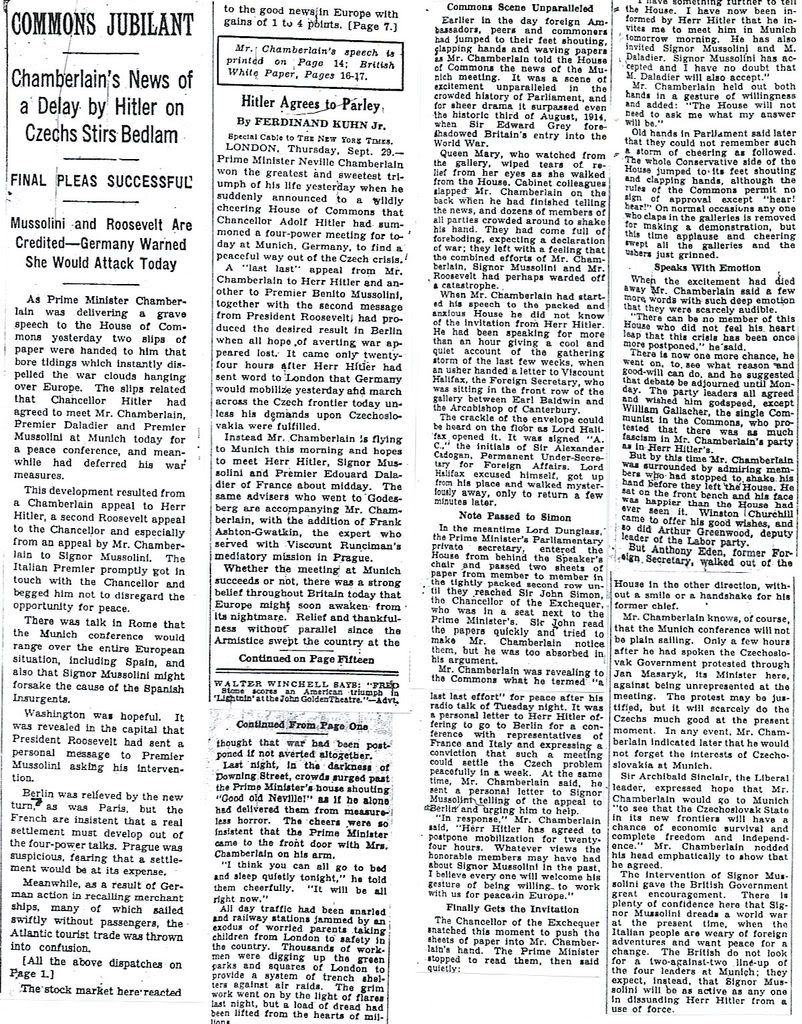
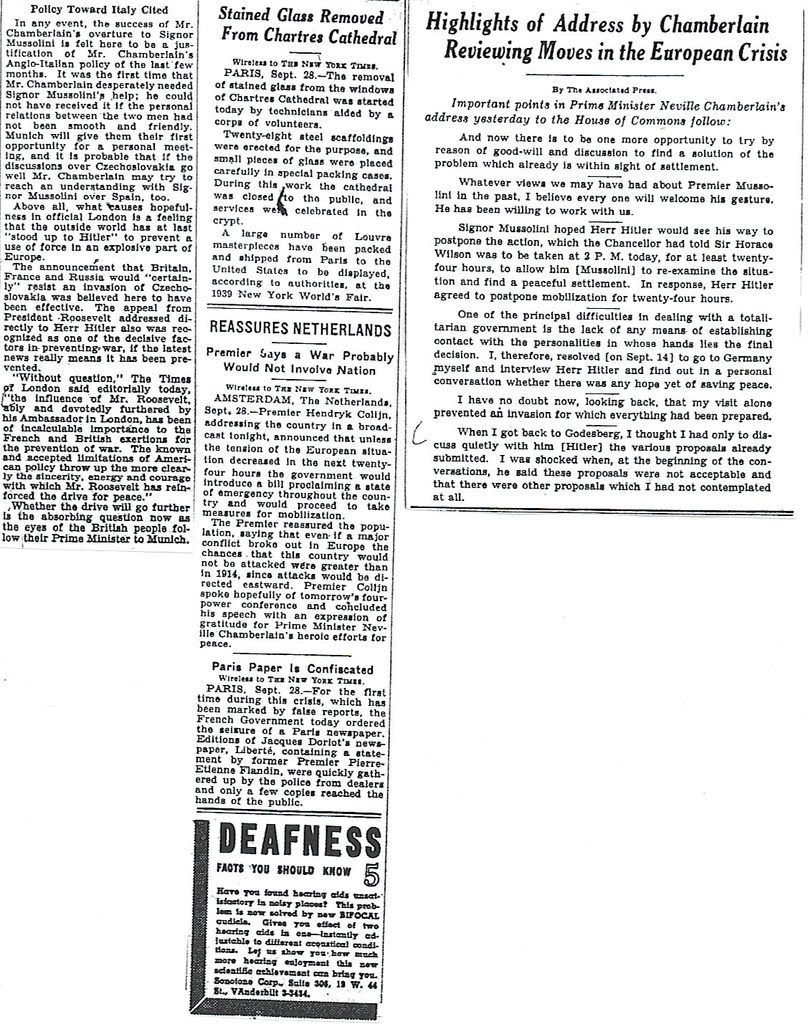
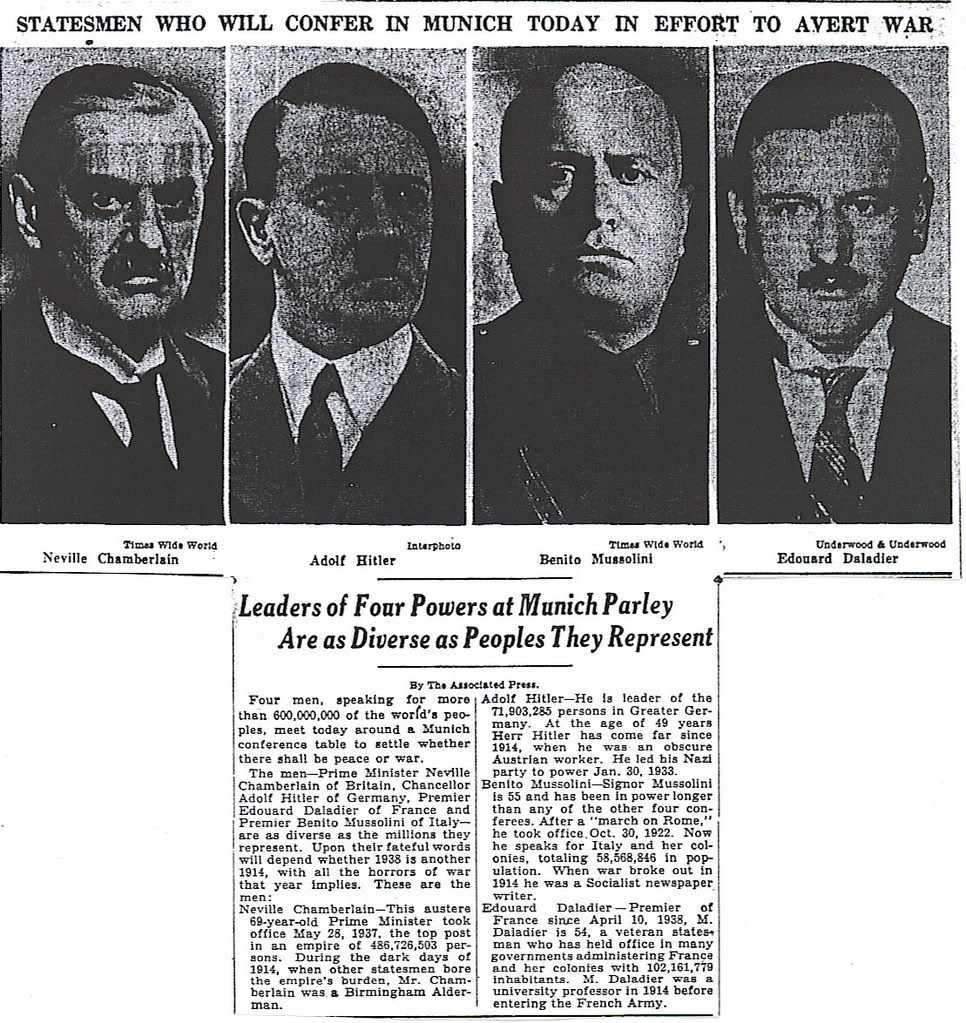
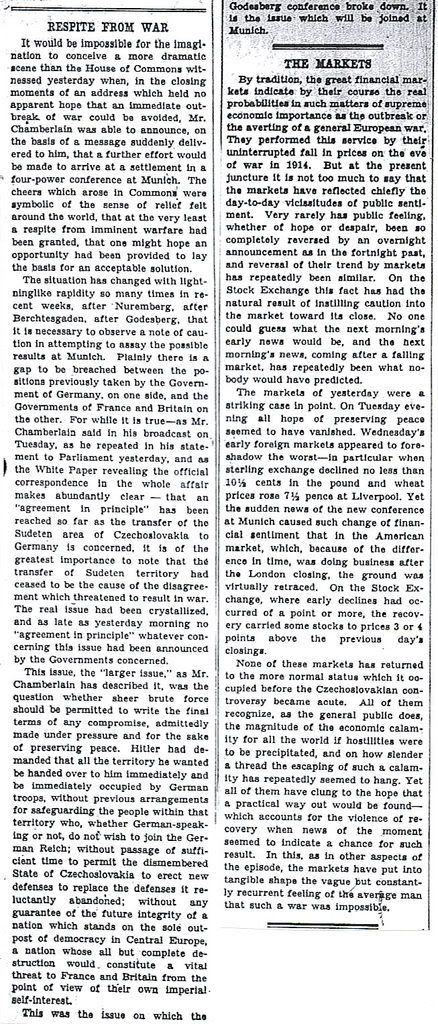
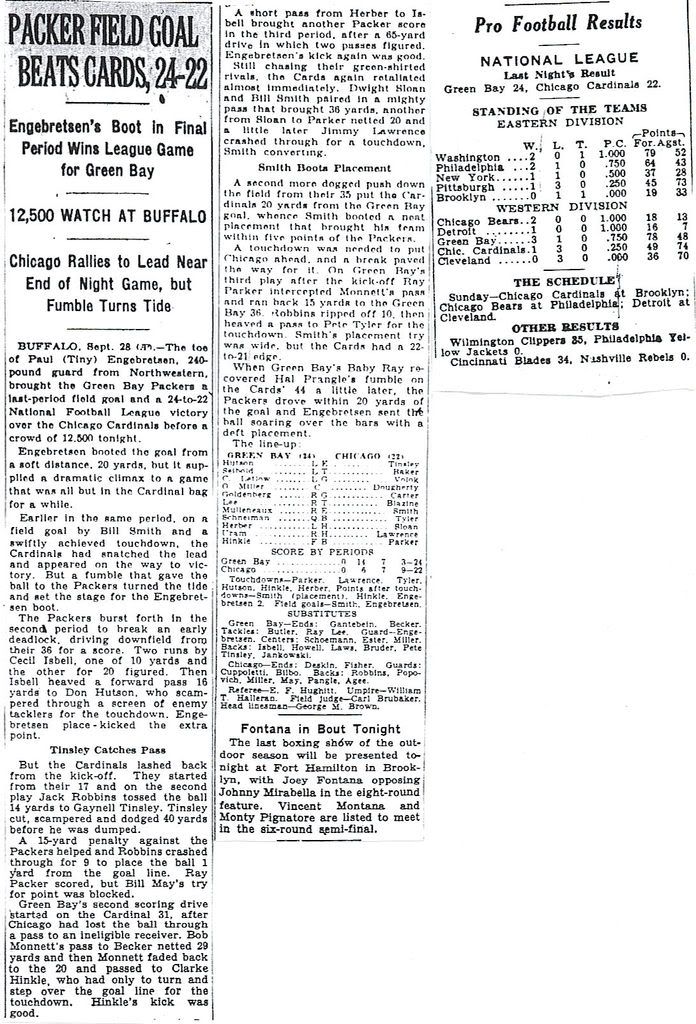
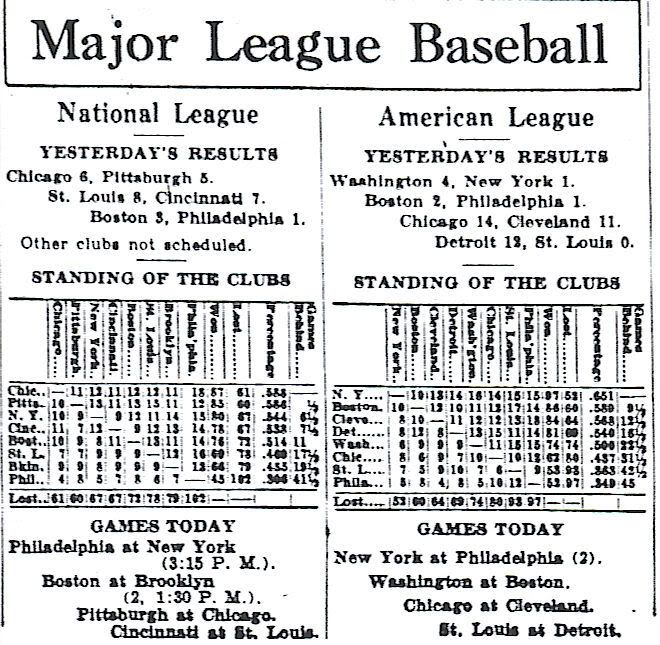
It may be sweet at first, but there is a strange aftertaste.
In other news, the Green Bay Packers beat the Chicago Cardinals. Where did they play? Buffalo, of course.
And the Cubs beat Pittsburgh to move into first place by a half game with four days remaining in the season.
bttt
In this baroque Bavarian city where in the murky back rooms of rundown little cafes he had made his lowly start as a politician and in whose streets he had suffered the fiasco of the Beer Hall Putsch, Adolf Hitler greeted, like a conqueror, the heads of governments of Great Britain, France and Italy at half past noon on September 29.
Very early that morning he had gone to Kufstein on the former Austro-German frontier to meet Mussolini and set up a basis for common action at the conference. In the train coming up to Munich Hitler was in a bellicose mood, explaining to the Duce over maps how he intended to "liquidate" Czechoslovakia. Either the talks beginning that day must be immediately successful, he said, or he would resort to arms. "Besides," Ciano, who was present, quotes the Fuehrer as adding, "the time will come when we shall have to fight side by side against France and England." Mussolini agreed.
Chamberlain made no similar effort to see Daladier beforehand to work out a joint strategy for the two Western democracies with which to confront the two fascist dictators. Indeed, it became evident to many of us in contact with the British and French delegations in Munich as the day progressed that Chamberlain had come to Munich absolutely determined that no one, certainly not the Czechs and not even the French, should stand in the way of his reaching a quick agreement with Hitler. In the case of Daladier, who went around all day as if in a daze, no precaution was necessary, but the determined Prime Minister took no risks.
The talks, which began at 12:45 P.M. in the so-called Fuehrerhaus in the Koenigsplatz, were anticlimactic and" constituted little more than a mere formality of rendering to Hitler exactly what he wanted when he wanted it. Dr. Schmidt, the indomitable interpreter, who was called upon to function in three languages, German, French and English, noticed from the beginning "an atmosphere of general good will." Ambassador Henderson later remembered that "at no stage of the conversations did they become heated." No one presided. The proceedings unfolded informally, and judging by the German minutes of the meeting which came to light after the war, the British Prime Minister and the French Premier fairly fell over themselves to agree with Hitler. Even when he made the following opening statement:
He had now declared in his speech at the Sportpalast that he would in any case march in on October 1 . He had received the answer that this action would have the character of an act of violence. Hence the task arose to absolve this action from such a character. Action must, however, be taken at once.
The conferees got down to business when Mussolini, speaking third in turn — Daladier was left to the last — said that "in order to bring about a practical solution of the problem" he had brought with him a definite written proposal. Its origins are interesting and remained unknown to Chamberlain, I believe, to his death. From the memoirs of Francois-Poncet and Henderson it is obvious that they too were ignorant of them. In fact, the story only became known long after the violent deaths of the two dictators.
What the Duce now fobbed off as his own compromise plan had been hastily drafted the day before in the German Foreign Office in Berlin by Goering, Neurath and Weizsaecker behind the back of Foreign Minister von Ribbentrop, whose judgment the three men did not trust. Goering took it to Hitler, who said it might do, and then it was hurriedly translated into French by Dr. Schmidt and passed along to the Italian ambassador, Attolico, who telephoned the text of it to the Italian dictator in Rome just before he entrained for Munich. Thus it was that the "Italian proposals," which provided the informal conference not only with its sole agenda but with the basic terms which eventually became the Munich Agreement, were in fact German proposals concocted in Berlin.
This must have seemed fairly obvious from the text, which closely followed Hitler's rejected Godesberg demands; but it was not obvious to Daladier and Chamberlain or to their ambassadors in Berlin, who now attended them. The Premier, according to the German minutes, "welcomed the Duce's proposal, which had been made in an objective and realistic spirit," and the Prime Minister "also welcomed the Duce's proposal and declared that he himself had conceived of a solution on the lines of this proposal." As for Ambassador Henderson, as he later wrote, he thought Mussolini "had tactfully put forward as his own a combination of Hitler's and the Anglo-French proposals"; while Ambassador Francois-Poncet got the impression that the conferees were working on a British memorandum "drawn up by Horace Wilson." So easily were the British and French statesmen and diplomats, bent on appeasement at any cost, deceived!
With the "Italian" proposals so warmly welcomed by all present, there remained but a few details to iron out. Chamberlain, as perhaps might have been expected from an ex-businessman and former Chancellor of the Exchequer, wanted to know who would compensate the Czech government for the public property which would pass to Germany in the Sudeten-land. Hitler, who, according to Francois-Poncet, appeared somewhat pale and worried, and annoyed because he could not follow, as Mussolini could, the talk in French and English, replied heatedly there would be no compensation. When the Prime Minister objected to the stipulation that the Czechs moving out of the Sudetenland could not even take their cattle (this had been one of the Godesberg demands)—exclaiming, "Does this mean that the farmers will be expelled but that their cattle will be retained?"—Hitler exploded.
"Our time is too valuable to be wasted on such trivialities!" he shouted at Chamberlain. The Prime Minister dropped the matter.
He did insist at first that a Czech representative ought to be present, or at least, as he put it, be "available." His country, he said, "could naturally undertake no guarantee that the [Sudeten] territory would be evacuated by October 10 [as Mussolini had proposed] if no assurance of this was forthcoming from the Czech government." Daladier gave him lukewarm support. The French government, he said, "would in no wise tolerate procrastination in this matter by the Czech government," but he thought "the presence of a Czech representative, who could be consulted, if necessary, would be an advantage."
But Hitler was adamant. He would permit no Czechs in his presence. Daladier meekly gave in, but Chamberlain finally won a small concession. It was agreed that a Czech representative might make himself available "in the next room," as the Prime Minister proposed.
And indeed during the afternoon session two Czech representatives, Dr. Vojtech Mastny, the Czech minister in Berlin, and Dr. Hubert Mas-arik, from the Prague Foreign Office, did arrive and were coolly ushered into an adjoining room. There, after they had been left from 2 P.M. to 7 to cool their heels, the roof figuratively fell in on them. At the latter hour Frank Ashton-Gwatkin, who had been a member of the Runciman mis sion and was now on Chamberlain's staff, came to break the bad news to them. A general agreement had been reached, the details of which he could not yet give to them; but it was much "harsher" than the Franco-British proposals. When Masarik asked if the Czechs couldn't be heard, the Englishman answered, as the Czech representative later reported to his government, "that I seemed to ignore how difficult was the situation of the Great Powers, and that I could not understand how hard it had been to negotiate with Hitler."
At 10 P.M. the two unhappy Czechs were taken to Sir Horace Wilson, the Prime Minister's faithful adviser. On behalf of Chamberlain, Wilson informed them of the main points in the four-power agreement and handed them a map of the Sudeten areas which were to be evacuated by the Czechs at once. When the two envoys attempted to protest, the British official cut them short. He had nothing more to say, he stated, and promptly left the room. The Czechs continued to protest to Ashton-Gwatkin, who had remained with them, but to no avail.
"If you do not accept," he admonished them, as he prepared to go, "you will have to settle your affairs with the Germans absolutely alone. Perhaps the French may tell you this more gently, but you can believe me that they share our views. They are disinterested."
This was the truth, wretched though it must have sounded to the two Czech emissaries. Shortly after 1 A.M. on September 30* Hitler, Chamberlain, Mussolini and Daladier, in that order, affixed their signatures to the Munich Agreement providing for the German Army to begin its march into Czechoslovakia on October 1, as the Fuehrer had always said it would, and to complete the occupation of the Sudetenland by October 10. Hitler had got what had been refused him at Godesberg.
There remained the painful matter—painful at least to the victims—of informing the Czechs of what they had to give up and how soon. Hitler and Mussolini were not interested in this part of the ceremony and withdrew, leaving the task to the representatives of Czechoslovakia's ally, France, and of Great Britain. The scene was vividly described by Masarik, in his official report to the Czech Foreign Office.
At 1:30 A.M. we were taken into the hall where the conference had been held. There were present Mr. Chamberlain, M. Daladier, Sir Horace Wilson, M. Leger [secretary general of the French Foreign Office], Mr. Ashton-Gwatkin, Dr. Mastny and myself. The atmosphere was oppressive; sentence was about to be passed. The French, obviously nervous, seemed anxious to preserve French prestige before the court. Mr. Chamberlain, in a long introductory speech, referred to the Agreement and gave the text to Dr. Mastny . . .
The Czechs began to ask several questions, but
Mr. Chamberlain was yawning continuously, without making any effort to conceal his yawns. I asked MM. Daladier and Leger whether they expected a declaration or answer of our Government to the Agreement. M. Daladier was noticeably nervous. M. Leger replied that the four statesmen had not much time. He added hurriedly and with superficial casualness that no answer was required from us, that they regarded the plan as accepted, that our Government had that very day, at the latest at 3 P.M., to send its representative to Berlin to the sitting of the Commission, and finally that the Czechoslovak officer who was to be sent would have to be in Berlin on Saturday in order to fix the details for the evacuation of the first zone. The atmosphere, he said, was beginning to become dangerous for the whole world.
He spoke to us harshly enough. This was a Frenchman . . . Mr. Chamberlain did not conceal his weariness. They gave us a second slightly corrected map. Then they finished with us, and we could go.
I remember from that fateful night the light of victory in Hitler's eyes as he strutted down the broad steps of the Fuehrerhaus after the meeting, the cockiness of Mussolini, laced in his special militia uniform, the yawns of Chamberlain and his air of pleasant sleepiness as he returned to the Regina Palace Hotel.
Daladier [I wrote in my diary that night], on the other hand, looked a completely beaten and broken man. He came over to the Regina to say good-bye to Chamberlain. . . . Someone asked, or started to ask: "Monsieur le President, are you satisfied with the agreement?" He turned as if to say something, but he was too tired and defeated and the words did not come out and he stumbled out the door in silence.
*The agreement was dated September 29, though not actually signed until the early-morning hours of September 30. It stipulated that the German occupation "of the predominantly German territory" should be carried out by German troops in four stages, from October 1 through October 7. The remaining territory, after being delimited by the "International Commission," would be occupied "by October 10." The commission was to consist of representatives of the four Big Powers and Czechoslovakia. Britain, France and Italy agreed "that the evacuation of the territory shall be completed by October 10, without any existing installations having been destroyed, and that the Czechoslovak Government will be held responsible for carrying out the evacuation without damage to the said installations."
Further, the "International Commission" would arrange for plebiscites, "not later than the end of November," in the regions where the ethnographical character was in doubt and would make the final determination of the new frontiers. In an annex to the accord, Britain and France declared that "they stand by their offer . . . relating to an international guarantee of the new boundaries of the Czechoslovak State against unprovoked aggression. When the question of the Polish and Hungarian minorities . . . has been settled, Germany and Italy, for their part, will give a guarantee to Czechoslovakia."
The pledge of plebiscites was never carried out. Neither Germany nor Italy ever gave the guarantee to Czechoslovakia against aggression, even after the matter of the Polish and Hungarian minorities was settled, and, as we shall see, Britain and France declined to honor their guarantee.
William L. Shirer, The Rise and Fall of the Third Reich, pp. 414-418
Psst Neville, don’t sign anything.
You know ... reading this stuff for some reason reminds me of the frantic activity surrounding the bailout bill. Patches affixed here and there to an underlying fabric that is rotten and falling apart.
Meanwhile on the same day we have NBC's Fred Bates reporting.
Finally, here are Chamberlains departing words from the 28th as he left for Munich.
Let’s just get something signed so we can go home and the voters will see us doing something decisive. What’s the worst that can happen?
I try to imagine what it was like to be these two people. You spend 5 hours in a room waiting while next door two very wobbly "allies" and two ruthless dictators "negotiate" the fate of your nation. Personally, if it had been me in that situation it would have gotten ugly. I have far too bad of a temper to put up with what is clearly a sham job. I would have told Hitler to get stuffed.
Lol. Yeah, what’s the worse that could happen. It’s not like it’s our land we are giving up.
Disclaimer: Opinions posted on Free Republic are those of the individual posters and do not necessarily represent the opinion of Free Republic or its management. All materials posted herein are protected by copyright law and the exemption for fair use of copyrighted works.